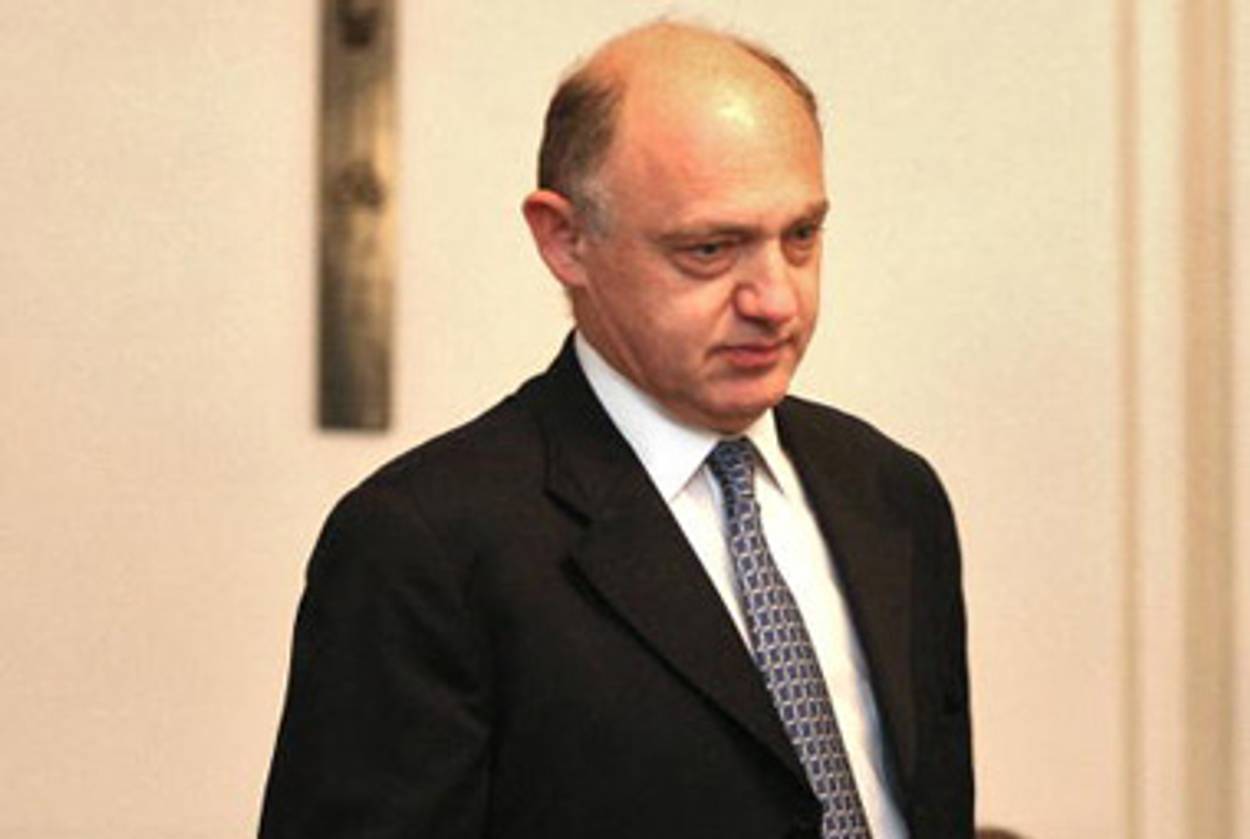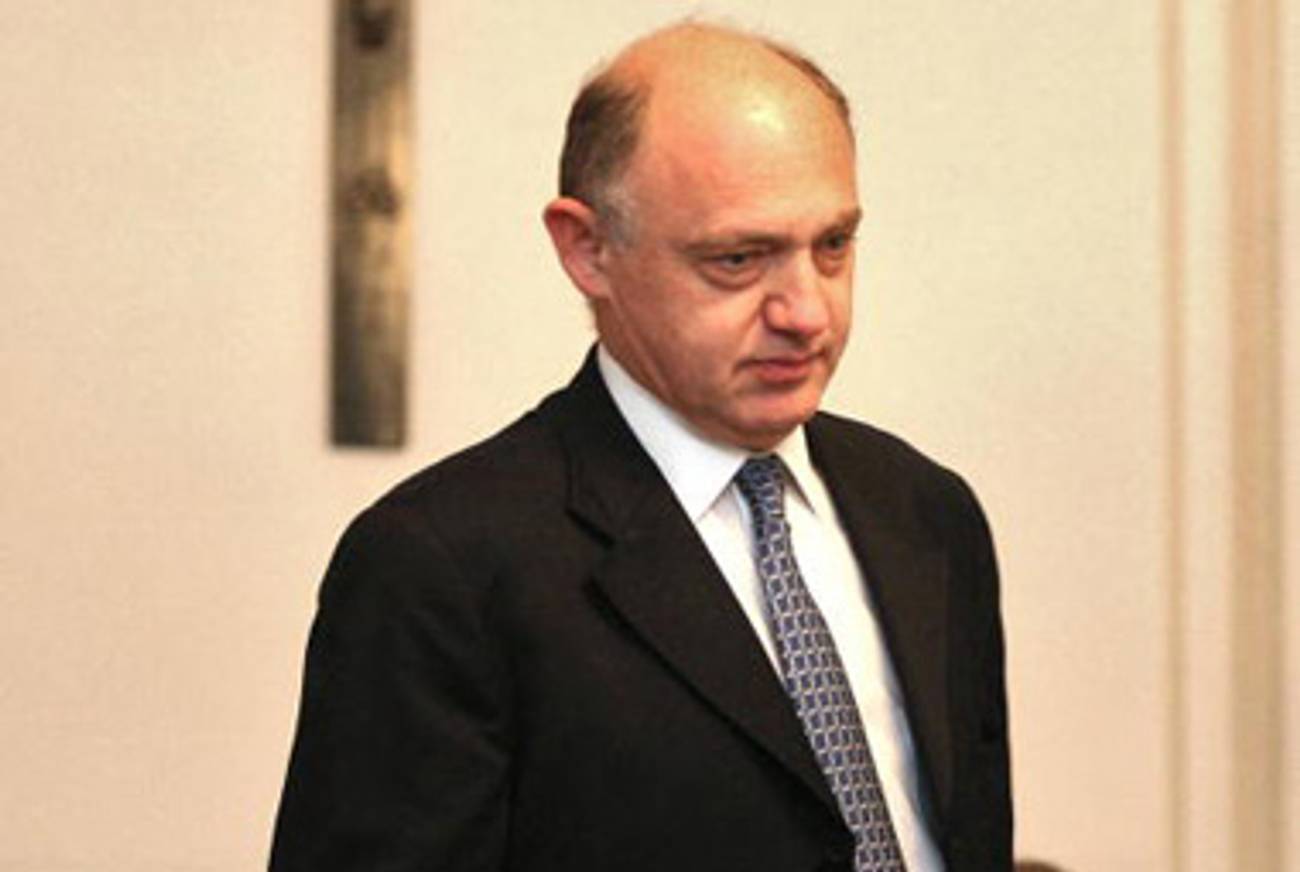Diplomatic Immunity
Jacobo Timerman’s son Héctor says there’s no such thing as an anti-Semitic country




This is the second in a two-part series.
In December 2009, I interviewed Héctor Timerman, the second of Jacobo Timerman’s three sons. Hector was 22 when his father was imprisoned by the Argentine military junta in 1977. Today he is Argentina’s ambassador to the United States. His country’s embassy is in one of Washington’s most elegant buildings. In an understated upstairs waiting room, an elderly woman dressed in a white uniform and slippers brings me coffee on a sterling silver platter which holding a porcelain cup, a sterling silver milk pitcher, and a small silver spoon. Above and behind me are portraits of Argentina’s 50 previous ambassadors and of famous men of letters. Soon the wall will display the portrait of Héctor Timerman, the second Jewish Argentine ambassador to the United States.
Timerman tells me about his essay, “Torture: A Family Affair,” which concerns the effects of torture on families and was recently published by Human Rights Watch. Every day that went by with the family unable to secure Jacobo Timerman’s release, he says, meant another day of despair over whether their father might disappear or suffer more electric shock.
I ask the ambassador to describe his father. With some reservation he tells me that his father had a strong character and that it was difficult to convince him that he was wrong. “At some point,” he says, “you’d stop arguing with him because you realized you would not change his mind.” But he also tells me that his father was a tender person, who had the uncanny ability to listen, understand, and empathize. The ambassador says that though his father never imposed ideas on his sons, he shared with them his abiding belief in universal human rights. He tells me that he had always admired his father’s efforts, through La Opinión, the newspaper he published, to highlight the junta’s abuses, murders, and acts of anti-Semitism.
When I ask him why the Argentine Jewish community remembers Timerman rather bitterly, he says that his father was an outspoken critic of the regime and that the Jewish community feared this would bring about reprisals. His father, he says, strongly disapproved of those Jews who stayed quiet in order not to draw the regime’s wrath. His father felt ashamed of them. I ask him, as others had asked his father more than 30 years ago, if there is anti-Semitism in Argentina. He bristles at the question, as if angry that people could still ask this of his country, and then answers with the care and caution of a diplomat: the Church, the military, and the aristocracy were the institutions that manifested the most virulent form of anti-Semitism during the dictatorship. But Argentina as a nation, he says, has never been anti-Semitic; its people are not by nature anti-Semites.
I am as confounded as Robert Hill was back in 1976. According to Rabbi Roberto Graetz, who used to bring gefilte fish and challah to Timerman when he was in prison, Argentina has a long and well-documented history of anti-Semitism; several generations of army officers were trained and modeled after the German army, and during the Dirty War the Catholic Church was a prominent agent of anti-Semitism. How to explain the 1992 bombing of the Israeli Embassy and the 1994 bombing that destroyed the Jewish community center, leaving more than 100 dead and three times as many injured? How to explain the May 2009 clash between anti-Semites and Jews during a ceremony celebrating Israel’s independence day?
Héctor Timerman calibrates his remarks in the same way that his father did in the ’70s: anti-Semitism as a broad social phenomenon doesn’t really exist, Argentina itself is not anti-Semitic, no country is anti-Semitic. These statements contradict what Héctor Timerman told a U.S. Embassy official at the time of his father’s arrest. A State Department summary of the meeting describes Héctor Timerman saying “somewhat excitedly” that the current climate in Argentina was like that of Germany “just before Hitler’s Putsch” and that his father was arrested because of anti-Semitism. I can only guess at why Ambassador Timerman today insists on the distinction; his future, like his father’s, would be put at risk if he were to honestly answer the questions that I put to him. He is lying to me out of self-interest, and to protect his country. Or perhaps his opinions are simply a reflection of his social position. He is, in many ways, the man that his father wanted to become—a fully integrated member of the Argentine ruling elite.
The Timerman family, with the help of a lawyer, Alejo Ramos Padilla, has pursued justice in Jacobo’s case by prosecuting those involved in his illegal imprisonment and torture. “It doesn’t matter if they wear a uniform, a cassock, or a tie,” says Ramos Padilla. “We will bring them to justice.” In 2004, the family’s efforts led to the first successful conviction of a Catholic priest, Christian Von Wernich, of crimes against humanity. Some in Argentina say that Héctor Timerman is vengeful. “Maybe they are right,” he responds, “but I’m seeking my revenge through the legal process, through the tribunals.”
Bitterly, Héctor Timerman tells me about others who have made accusations against his father. Tomás Eloy Martínez, a professor and former journalist, has suggested that Jacobo Timerman was never tortured and that he betrayed other journalists. I had heard such rumors in Argentina. Héctor Timerman tells me about General Ramón Camps’s book, El Caso Timerman, Punto Final. Camps, who died in 1994 from cancer, claimed to have tortured 5,000 individuals, including Timerman. The police chief of Buenos Aires during the junta, Camps was sentenced during the presidency of Raúl Alfonsín but then pardoned by his successor, Carlos Menem. He was a zealous military hardliner who went after leftists with special gusto. Camps could not stand the fact that, of the thousands he had tortured, Timerman had survived to write about it. In 1983, he wrote a torturer’s testimony in response to Prisoner without a Name.
“The torturer is believed,” Héctor Timerman tells me incredulously. We both pause at the bizarreness of this idea. I think how absurd it is that a publisher would take on such a book. But then I remember that not all Argentineans disagreed with Camps. The junta instilled in the people of Argentina a moral code so strict and certain that it pitted neighbor against neighbor. Graetz, who today serves a congregation in California, told me, “When I preached against the military regime the members of my congregation would walk out. Then when I returned years later to Argentina, these same members would ask me why, if I was such a proponent of human rights, I hadn’t told them what was going on. And I would remind them that years earlier they had walked out.”
***
And what about Timerman? How should we remember him? Is it possible to believe that the four books Timerman wrote after being tortured contain valid points about politics, human rights, and Jewish identity that should compel our attention, even after we know the truth about the man and his flaws? In these books Timerman is angry and quarrels with the world. He attacks his own community, he attacks Israel, he criticizes Chile and Cuba. In 1991, he went silent.
I initially set out to write a commemoration of Timerman on the 10th anniversary of his death because he inspired me as a graduate student in Latin American studies. But what I found was not the noble Jew I remembered fighting for human rights and against anti-Semitism, but a deeply flawed human being who knew how to pull the heartstrings of those who still believe that human rights are an essential human concern. For me he remains a figure as tragic as the saddest of the great German Jewish thinkers—described so eloquently in Amos Elon’s The Pity of it All—who felt more patriotic than the Germans themselves, yet were never truly accepted as members of the society that eventually killed them. Timerman let himself believe that his embrace of Argentina would allow him a special place in the junta. What then could have been going through his mind as he was accused of being a dirty Jew? He never really tells us, but it surely stung.
The fact that Timerman was a Jew meant that he was less. That knowledge, through electric shock, beatings, threats, and humiliation, led him to write four books in anger—anger at his own deception and downfall, at the world for not understanding Jews, at the open Jewish grave he wrote of carrying in his heart. His four post-torture books reveal a disassociation characteristic of traumatized victims, disassociation between the tortured man and the brilliant journalist to whom this was not supposed to happen. That schism, now reversed, created Timerman’s personal tragedy: his inability to see himself as a potential victim of the junta because he was so close to it; his inability to understand how the junta had so abruptly and irrevocably ruined him by first corrupting his own moral sense and then brutally torturing him. The undercurrent of torment and guilt that runs through his testimony about human rights abuses throughout the world derives from recognizing that he was misguided, even naïve, in his sense of belonging. When throughout his testimony he accuses the Argentine Jewish community of trying to remain “faceless,” of being complicit in its silence, he is really criticizing himself. Deep down, Timerman was a member of the Argentine Jewish community that he condemned. For all his brilliance and power, he, like so many before him, misread the signals, avoided the facts, participated in the game of “it is but it isn’t,” and, in the end, was tortured as a judio de mierda.
Bridget Kevane is a professor of Latin American studies at Montana State University.
Bridget Kevane is a professor of Latin American and Latino literature at Montana State University in Bozeman. Her work has appeared in the New York Times Book Review, ZEEK, the Forward, and Brain, Child, among other publications.
Bridget Kevane is a professor of Latin American and Latino literature at Montana State University in Bozeman. Her work has appeared in the New York Times Book Review, ZEEK, the Forward, and Brain, Child, among other publications.